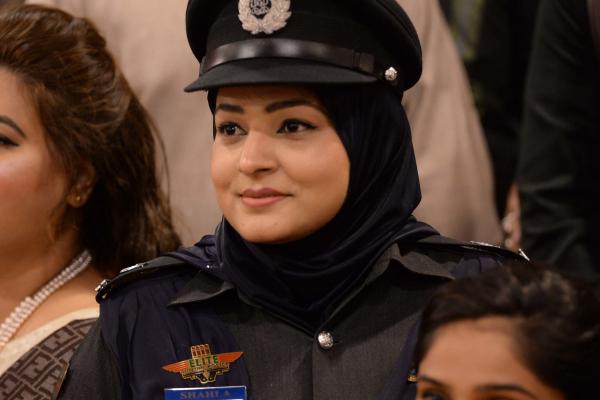Thirty years ago, Benazir Bhutto became the first woman to serve as prime minister of Pakistan, which many saw as a sign of change for women in Pakistani society.
But three decades on, women haven’t made the strides spoken of when Benazir came into power. Gender-based violence goes unreported, with women fearful of reporting crimes to the police. Shehla Qureshi is working to change this.

To protect and serve?
Shehla Qureshi, 30, commands eight police stations, is a vocal supporter of women’s rights and is the first woman to be appointed superintendent of Karachi, the most populated city in Pakistan.
“Police are the protectors of all rights, and there are no rights without women’s rights,” says Shehla. She recognises the irony of a police force whose duty it is to ‘protect and serve’, in a society where so many women do not feel protected by the police.
Shehla has been working with the Pakistan Forum for Democratic Policing (PFDP), supported by VSO, to change attitudes to the police, and to understand some of the barriers women experience when reporting crimes. According to a country-wide survey from 2012, more than half of Pakistani women who experience violence never tell anyone about it.
For many women, police stations can be intimidating environments, with armed guards stationed at the door. Attempts have been made to open up these spaces to women, by introducing a ‘women’s facilitation desk’ in each police station, manned by women police officers.
However, police stations remain male-dominated environments. In fact, Shehla is an outlier – in Pakistan, women make up just 1.5% of all police, up from 0.9% in 2015.
Why would an intelligent woman want to join a poorly paid bureaucratic role which shuts down their potential?Shehla Qureshi
Why would any woman want to become a police officer?
Shehla is setting an example to a generation of girls in Pakistan, as the first woman to be appointed as superintendent of Karachi, but will any more women actually want to join?
Currently, many women working in Pakistan’s police stations are relegated to desk-based, junior positions, given little responsibility.
In Shehla’s own words, “Why would an intelligent woman want to join a poorly paid bureaucratic role which shuts down their potential?”
Even Shehla herself as superintendent is frequently treated like a junior and given no budget to work with, a very different experience to her male counterparts at a similar level.
Perceptions of police and a lack of women in the police force are exacerbating the problem of gender-based violence in Pakistan, as crimes against women go unpunished. Nearly a third of married women aged 15-49 have experienced physical violence from their husbands, according to a UN Women report.

Caught in a double bind
As a woman in Pakistan, if you want to accuse someone of rape, you will need a huge body of proof, finding at least four male eyewitnesses. DNA evidence is not considered enough for conviction.
At the same time, you may be prosecuted for having sex outside marriage, known as ‘zina’, in Pakistani society. This crime is punishable by death.
Women are caught in a double bind – unable to prosecute their rapist, and at risk of being prosecuted themselves.
Speaking to Karachi’s US consulate, Shehla said, “We cannot provide justice at the grassroot-level. Even when police plays its role, a victim must go through many other tricky legal procedures.”
Some laws protecting women have been introduced. For example, in 2015, the Protection of Women Against Violence Bill criminalised all forms of violence against women.
However, these laws are not widely implemented, and many women don’t even know they exist.
Tackling the issue from all sides
It’s difficult to pinpoint one reason why gender-based violence goes unreported in Pakistan. Shehla is tackling the issue from all sides, working with police officers and the general public – she says that crime will only reduce when the gap between the police and the community has closed.
All-women police stations are the beginning. Shehla is in charge of an all-women police station in Karachi, intended to encourage women to report crimes without fear of being disbelieved or punished for speaking out.
All-women police stations are especially necessary because women can only report crimes to women police officers. However, working as a woman police officer has its difficulties – most women in Pakistan don’t drive, so criminals have to be brought to the police station on public transport.
The PFDP is another step forward. With the support of VSO, this forum is openly discussing the issues surrounding gender-based violence, revising outdated laws and building relationships between the police, women’s shelters, local NGOs and the general public.
Beyond changing perceptions of the police and making it easier for women to report crime, sparking a shift in attitudes is essential so that crimes against women are no longer seen as inevitable and accepted.
Shehla herself is keeping women’s issues on the agenda, raising the profile of women’s rights and calling for greater enforcement of laws, so that violence against women is finally widely recognised as a problem in Pakistani society.
Find out more about VSO's work to tackle inequality in Pakistan:
Read more

Kenyan beef pilau recipe
In this blog, some of our VSO family share their favourite mouth-watering recipes and highlight the work they’re doing to promote sustainable farming practices and healthy eating. Here is a recipe for Kenyan beef pilau from volunteer Fridah.

Bangladeshi tomato bhorta recipe
In this blog, some of our VSO family share their favourite mouth-watering recipes and highlight the work they’re doing to promote sustainable farming practices and healthy eating. Here is the Bangladeshi tomato bhorta inspired by Maleka’s vegetable garden.

Pakistani chicken biryani recipe
In this blog, some of our VSO family share their favourite mouth-watering recipes and highlight the work they’re doing to promote sustainable farming practices and healthy eating. Here is Pakistani chicken biryani from volunteer Khajida.
